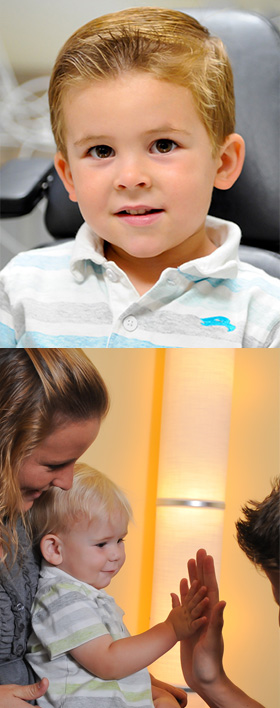Faqs
Frequently Asked Questions
1What Types Of Anesthesia Might My Child Receive?
Many dental procedures for children can be done with local anesthesia alone, or sometimes in conjunction with sedative pills or nitrous oxide (laughing gas). However, certain complex cases or children with anxiety may require a more controlled and deeper level of sedation or general anesthesia. Sedation reduces consciousness, pain, and anxiety while maintaining patient cooperation. General anesthesia removes memory of the event and allows your child to rest comfortably during the dental treatment. All of our dental anesthesiologists are exceptionally well trained at providing all levels of anesthesia so that your dentist can fully focus on the dental procedure. This allows for a safer, more predictable, and comfortable experience for your child.
2Is It Safe For My Child To Have Anesthesia?
Your child’s safety is our ultimate goal. Our team has the most current, well-maintained, and organized anesthesia equipment in the industry, and we continue to study extensively on the most recent advancements and treatment options in the field. Rest assured that when using our service, your child will be provided a safe, controlled and hospital grade anesthetic experience in the comfort of your pediatric dental office.
3Why Is Anesthesia Necessary?
There are many children who may benefit from sedation/general anesthesia. Children who gag easily, who experience discomfort while keeping their mouth open, or just general anxiety about dental treatment could all benefit. Sedation/general anesthesia will provide increased comfort for your child, excellent working conditions for the pediatric dentist, and it provides the convenience of a single visit to the pediatric dental office.
4Why Is It Important That My Child Follow An Eating Policy?
A period of fasting is necessary prior to your child’s procedure to make sure the stomach is empty. A child with something in their stomach can regurgitate that food or fluid while they are sedated and that material may enter the lungs. It is for this reason that it is very important to follow the eating policy given by the anesthesiologist. If you and your child do not follow these specific instructions, then you could jeopardize your child’s safety, and the procedure will be canceled.
5What Happens During My Child’s Surgery?
During surgery, there will be at least three caregivers (including the anesthesiologist) with your child throughout the entire procedure. The anesthesiologist will continuously monitor your child’s response to the anesthesia and surgery. He or she will use the very least amount of medications possible to provide a safe and comfortable experience for your child. The dental procedure and the medical conditions of your child will dictate the type of anesthesia and monitoring used.
6Should I Tell My Child About The Shot?
Usually, it’s best not to. The injection itself is small and not very painful, but anticipating the shot is the scary part. We have found that children who are told about the injection beforehand have trouble sleeping the night prior to the procedure and arrive at the office scared and nervous. After receiving the injection, these children cry longer and are more difficult to comfort. Ultimately, the decision to tell or not tell your child is yours, but we advise against it.
What we do recommend is that you allow your child to bring along something familiar and comforting, such as a favorite blanket or toy. And more importantly, we stress that you try not to transfer your own anxieties about the procedure onto your child. Your composure as a parent is essential because if you are calm and confident, your child will feel more secure.
7Why Can’t I Be With My Child In The Dental Treatment Room During Anesthesia?
From your child’s perspective, you will be with him/her for the entire appointment. You will be present when he/she falls asleep and when he/she awakes. When your child is away from you in the treatment room, there will be at least three caregivers (including the anesthesiologist) with your child during the entire procedure. Your child does not benefit from your presence in the treatment room because he/she will be asleep. Also, having a parental presence in the room creates an emotionally distracting atmosphere that inhibits open communication among your child’s care team. This can delay or inhibit actions necessary for your child’s safety or care. For this reason, we do not allow parents in the dental treatment room during sedation. Thank you for your understanding.
8When The Dental Procedure Is Done, How Long Will My Child Sleep?
Most children are awake and ready to go home 15 to 30 minutes after the dentist has completed all dental work. It is important that a responsible adult accompany the patient throughout the day of the procedure. Your child should drink plenty of fluids and take pain medication as directed by your surgeon if needed. Typically, there are no limitations 24 hours after discharge from the office.


